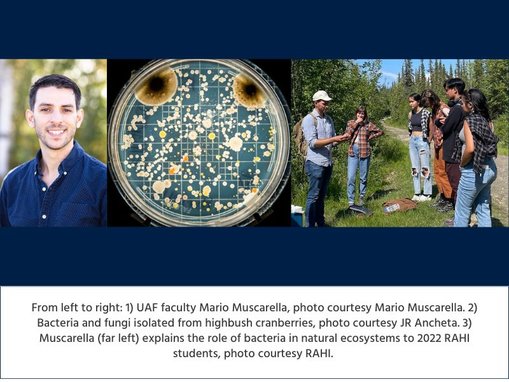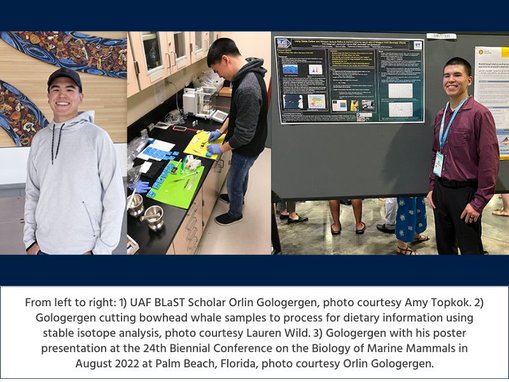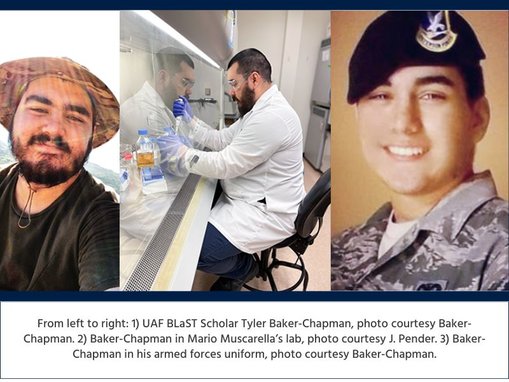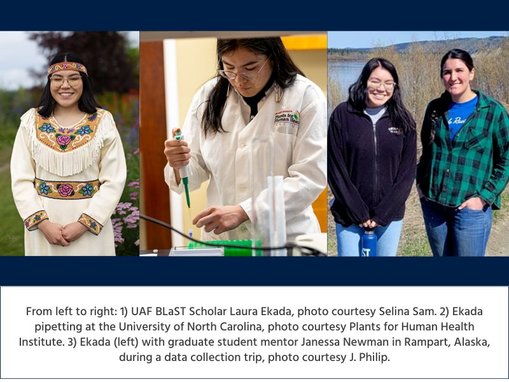
DPC Newsletter
Student Conferences Spotlight
Volume 7, Issue 3

Consortium News
UAF BLaST celebrates Scientists of the Month for August, September, October and November 2022
By Amy Topkok
Since 2016, the Biomedical Learning and Student Training (BLaST) program at University of Alaska Fairbanks (UAF) has highlighted scientists from all biomedical fields through its Scientist of the Month articles. These are shared across all UAF and University of Alaska Southeast rural campuses and with BLaST’s partners: Iļisaġvik College, Fort Lewis College, Diné College, Salish Kootenai College and Alaska Pacific University. For more Scientist of the Month highlights, visit the BLaST website.
Read below to learn more about the most recent BLaST Scientists of the Month: Mario Muscarella, Orlin Gologergen, Tyler Baker-Chapman and Laura Ekada.

Mario Muscarella, August 2022 Scientist of the Month
Mario Muscarella, PhD, is an assistant professor of microbiology at the Institute of Biology and Department of Biology & Wildlife at UAF. He received a BLaST faculty pilot project award for 2021 to 2023.
Muscarella earned his PhD in biology from Indiana University with an emphasis in both ecology and evolution and microbiology. He completed his postdoctoral training at Illinois University. He enjoys outdoor activities like hiking, camping and skiing, as well as doing projects around the home.
Muscarella joined UAF in July 2020 and has since recruited a number of undergraduate and graduate students, and a research professional to join his lab. The Muscarella Lab focuses on the role of microorganisms in natural, host and managed ecosystems, which includes exploring factors that contribute to and impact microbial biodiversity for ecosystem function.
He is the Principal Investigator (PI) of a BLaST faculty pilot project that focuses on wild Alaskan berries and the importance of their microbiomes. Muscarella and his students are looking at impacts of climate change that cause low-quality berry conditions such as berry rot and desiccation, and the role of microorganisms in the environment and how environmental changes alter the structure and function of microbial communities.
For this work, the team is collecting berries from around the UAF campus and at the Caribou Poker Creek Research Watershed located about 50 kilometers (or 31 miles) northeast of Fairbanks, Alaska.
Muscarella teaches numerous courses including microbiology, computational skills in biology, and a microbial ecology seminar. He recently taught a portion of an undergraduate research experience course to the Rural Alaska Honors Institute’s (RAHI) 2022 Summer Research students. Muscarella encourages students to be highly engaged and to think critically about the course content. His goal is to promote scholarship and strengthen students' ability to apply what they learn rather than memorize facts.
Since joining UAF, Muscarella has mentored six undergraduate researchers including BLaST Scholars Jill Jacobs and Tyler Baker-Chapman, along with two undergraduates from Skidmore College and Oberlin College. In addition, he mentors two UAF graduate students and will be welcoming a third this fall. The Muscarella Lab believes in an open, inclusive, collaborative lab atmosphere that promotes personal well-being and research enthusiasm. This includes establishing mentorship plans that acknowledge the mentees’ desired outcomes and mentee/mentor expectations. His lab also encourages undergraduates to seek career and professional development opportunities through the Ecological Society of America, the American Society for Microbiology and other organizations.
Orlin Gologergen, September 2022 Scientist of the Month
Orlin Gologergen, a first-generation college student of Siberian Yupik descent, is a UAF sophomore pursuing a Bachelor of Science in biological sciences with a minor in marine science.
Gologergen is a third-year BLaST Scholar from Savoonga, Alaska. He was raised in Nome and attended Mt. Edgecumbe High School in Sitka. He previously was a BLaST Undergraduate Research Experience student at the University of Alaska Southeast (UAS) campus before attending UAF. Gologergen is interested in marine mammal health and ecology. His future goal is to pursue a master’s degree in marine biology to further understand how toxins affect marine organisms.
Gologergen started his research journey at UAS Sitka in the Cetacean-Human Interaction Lab led by Jan Straley, where he studied bowhead whale skin to explore turnover rates and diet. While at UAF, Gologergen volunteered at the Alaska Department of Fish and Game in the spring of 2021, where he processed ice seals and whale stomachs in search of parasites. He also worked in the Fairbanks Alaska Stable Isotope Facility lab to expand his first study from Fall 2021 to Spring 2022.

Gologergen has presented at the 2018 Western Alaska Interdisciplinary Science Conference held in Nome, and at the 24th Biennial Conference on the Biology of Marine Mammals in August 2022, in Palm Beach, Florida. This fall, he joined the Marine Ecotoxicology and Trophic Assessment Laboratory (METAL) lab to analyze bowhead whale skin for mercury concentrations.
In June 2022, Gologergen was a teaching assistant for a One Health Perspectives course as part of the 2022 JumpStart Summer Program, where he provided support to Ellen Chenoweth, PhD, a UAS faculty and BLaST Research, Advising and Mentoring Professional (RAMP). During the three-week course, Gologergen encouraged students to think critically about the course content. He continues to promote Alaska Native students in marine science and gives them tools to strengthen their ability to apply research oncology and pedagogy and how to involve their subsistence lifestyle into their academic research studies.
“He was very insightful, helping me plan the course and assess how it was progressing. It was a joy to watch him patiently mentor younger students one-on-one,” Chenoweth said.
Gologergen would like to thank his BLaST RAMP, Emily Sousa; and Straley, Chenoweth and Lauren Wild, PhD, of UAS Sitka for their support and guidance into the first years of his academic and scientific career.
“I first met Ms. Jan Straley, Dr. Lauren Wild and Dr. Ellen Chenoweth when I took a course at UAS Sitka during high school. They taught practical applications of stable isotope analysis for studying diets. Taking this course started my passion for science, where I am truly grateful to have met great research and life mentors,” Gologergen said.
Wild said Gologergen is a “hardworking student with great ambition.”
“He is one of those students that really gets you excited about teaching and mentoring. I learned just as much from him as he did from me, and that is what makes him special,” Wild said.
Gologergen also worked under former BLaST RAMP Andrew Cyr, PhD, who was instrumental in teaching him to process bowhead whale samples in the lab at UAF.

Tyler Baker-Chapman, October 2022 Scientist of the Month
Tyler Baker-Chapman, a first-generation college student of Thai descent who served in the United States Air Force, is a senior pursuing a bachelor’s of science degree in biological sciences with a concentration in physiology. He is a second-year BLaST Scholar, an Honors College scholar and a teaching assistant for a fundamentals of biology course at UAF. The Banning, California, native will graduate in December 2022. In his free time, he enjoys Thai and Lao food as one of the ways he embraces his heritage.
Baker-Chapman’s research focuses on host-bacteriophage interactions, coevolution and antibiotic resistance. He is interested in understanding how synergistically using antibiotics and phages selects against antibiotic resistance without driving evolutionary resistance to antibiotics and phages simultaneously.
Baker-Chapman’s experiment studied the coevolution of T4 Bacteriophage and E. coli REL606, an ancestral strain used in Richard Lenski’s, PhD, Long-Term Evolution Experiment at Michigan State University.
In his experiment, Baker-Chapman chemically transformed the E. coli strain by incorporating a pBR322 plasmid, which conferred ampicillin and tetracycline resistance. He then treated each cell line with ampicillin (amp), tetracycline (tet) and a combination of both antibiotics. He also added T4 phage to select for phage resistance in the presence of antibiotics. Samples were then analyzed to investigate changes in antibiotic and phage susceptibility.
“Antibiotic resistance is a global health concern today where bacteria have become resistant to many current antibiotics. It is extremely hard to develop novel antibiotics, so by studying bacteria’s natural killer, bacteriophage, it can help us develop better treatment strategies,” Baker-Chapman said.
In November 2022, Baker-Chapman presented at the Annual Biomedical Research Conference for Minoritized Scientists (ABRCMS) in Anaheim, California. During the past spring, he attended the annual Experimental Biology 2022 conference in Philadelphia, Pennsylvania. He hopes to bring advanced medicine, culturally-safe healthcare and innovative research to underserved communities across Alaska.
Baker-Chapman would like to thank Mario Muscarella, PhD, and Theresa Vertigan, his previous BLaST Research, Advising, and Mentoring Professional (RAMP), who mentored and supported him throughout his research journey.
“Dr. Mario’s experience and leadership inspired me to become the best version of myself I can be. His passion for research and innovation helped me realize the importance of lifelong learning and helped pave the way towards a career in medicine,” he said. “I also give thanks to Theresa for being such a great support. She helped me through imposter syndrome and provided a sense of confidence in my ability to succeed as a researcher and continue to work towards becoming a medical school candidate.”
Baker-Chapman was a UAF Resident Assistant (RA) where he mentored many students of diverse backgrounds throughout their academic journeys.
“Having faced many incidents of struggles and strife, I found that it is very difficult to focus on education when you’re faced with challenges outside the walls of the university. These challenges are often out of your control,” he said, adding that he utilized his life experiences to help students cope with the many challenges minorities can face in their first-time college experiences.
Laura Ekada, November 2022 Scientist of the Month
Laura Ekada, a third-year BLaST Scholar, is Athabascan and her family is from Minto, Nulato and Koyukuk, Alaska. Ekada attended Umpqua Community College in Roseburg, Oregon, for two years where she ran cross country and track and wrestled before coming to UAF. She is pursuing her bachelor’s of science degree in biology with a concentration in biomedicine and will graduate in December 2022. She plans to attend medical school in hopes of becoming a doctor and serving Alaska Native people in the interior of Alaska. She is interested in Indigenous culture and how it influences well-being.
Ekada’s research includes qualitative projects looking at cultural strengths and resilience of Alaska Native populations in relation to Athabascan values.
“Laura and her Alaska Native background and upbringing in her culture and having lived in rural Alaska, brought unique perspectives to the research team that helped define better themes and issues that are important to Alaska Native research,” said Janessa Newman, a former BLaST Scholar who is also Athabascan.

One BLaST research project is looking at questions on how culture and traditional activities could mitigate negative impacts of the pandemic, isolation, and their effects on mental health. Another project funded by the, American Indian/Alaska Native Clinical and Translational Research Program, examines how intergenerational connections, reflections on strengths and digital storytelling facilitates cultural connections and wellness for rural Alaska Native youth. Both highlight how cultural activities support well-being and helped Ekada learn how to conduct interviews and focus groups with Native populations, something that takes strong communication and facilitation skills.
“I was introduced to a facility where I got to see science in action, making it feel more plausible for me. I can see myself here,” Ekada said of her experience at the Plants for Human Health Institute in North Carolina.
Ekada recently sat on the 2022 White House Native Women’s Symposium virtual panel on mental health, a national symposium organized by the White House Office of Intergovernmental Affairs. She also presented her research at the 2021 NIH Diversity Program Consortium Virtual Research Symposium and at the 2021 John Hopkins School of Medicine Virtual C.A.R.E.S. Symposium as part of an internship as a MCHC/RISE-UP scholar. Recently, she presented at the Annual Biomedical Research Conference for Minoritized Scientists (ABRCMS) in November 2022 in Anaheim, California.
Ekada credits her mentors for teaching her valuable research skills such as qualitative analysis and research design. She has also gained experience writing research articles under the guidance of her mentors: Jacques Philip, PhD, a faculty research professor and BLaST faculty pilot project awardee of the Center for Alaska Native Health Research Center; Inna Rivkin, PhD, an associate professor of psychology; Janessa Newman, an interdisciplinary master’s student and former BLaST Scholar (2018-2019); Cathy Brooks, an associate professor in the Department of Alaska Native Studies and Rural Development; and Emily Sousa, Ekada’s BLaST Research, Advising and Mentoring Professional (RAMP).
“It has been a blast to work with Laura on our research projects. Laura used her unique Indigenous perspective to draw a scene that we included in a journal manuscript, visually illustrating how nature, animals and culture may contribute to well-being in Alaska rural communities,” Philip said.
“It’s wonderful to see Laura inspire and engage with youth, integrate art with science, and collaborate across disciplines and communities,” Rivkin added.
Ekada also serves as a leader by hosting “The Urban Auntie Show,” a student radio show that highlights Indigenous history, current events and issues important to many Alaska Native people through podcasts, music and newscasts. She is also a UAF student assistant peer educator at the Nanook Diversity and Action Center, helping plan many UAF student events.
The Coordination and Evaluation Center at UCLA is supported under award number U54GM119024.

Grow Together.